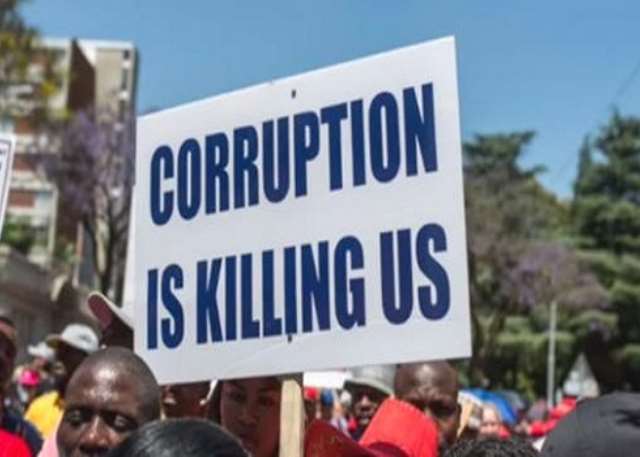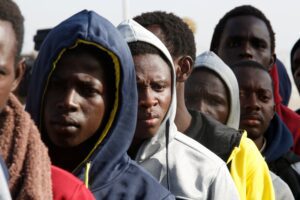
Source: Ghanaija
In the heart of Africa, amidst its diverse landscapes and cultures, the story of political corruption and its impact on democracy unfolds. This tale, set in various regions across the continent, highlights the struggles, triumphs, and resilience of ordinary people against the backdrop of political turmoil.
Chapter 1: The Rise of Corruption in Nokor
In the West African nation of Nokor, President Amadu Diop had been in power for over two decades. Once hailed as a revolutionary hero who fought for independence, Diop’s administration gradually succumbed to corruption. The wealth of Nokor, rich in natural resources, was siphoned off by a small elite circle surrounding the president.
Mariam Konate, a young journalist from the capital city of Akola, decided to investigate the corruption rumors. She discovered that government contracts were awarded to companies owned by the president’s relatives, and public funds were being diverted into private accounts abroad. Mariam’s exposés in the local newspaper garnered attention and anger among the populace, who were struggling with poverty and lack of basic services.
Chapter 2: The Ripple Effect in South Tanuba
Meanwhile, in the Southern African country of Tanuba, corruption had taken a different form. Governor Thando Mbeki of the province of Zulani was known for his lavish lifestyle, which starkly contrasted with the living conditions of his constituents. Roads were in disrepair, schools lacked resources, and hospitals were understaffed and under-equipped.
Thuli Nkosi, a school teacher in Zulani, became an unexpected leader in the fight against corruption. After her repeated petitions for school funding were ignored, she organized community meetings to raise awareness. The residents of Zulani started to see the direct connection between their hardships and the corruption at the provincial level. Thuli’s efforts led to peaceful protests demanding transparency and accountability from Governor Mbeki.
Chapter 3: The Battle in Eastern Kijani
In Eastern Kijani, a nation known for its vibrant culture and history, political corruption had infiltrated every level of government. The capital, Ujamaa, was buzzing with rumors of a secret alliance between high-ranking officials and foreign corporations. These corporations were granted exploitation rights to Kijani’s vast mineral resources, leaving the environment devastated and the local population marginalized.
Mwangi Okello, an environmental activist, had witnessed the degradation of his ancestral lands. Rivers were polluted, forests were cut down, and wildlife was disappearing. Mwangi organized grassroots campaigns to document the environmental damage and link it to corrupt practices. His efforts caught the attention of international NGOs, which began to support the cause, putting pressure on the Kijani government to reconsider its policies.
Chapter 4: The Turning Point in Central Zuwara
In Central Zuwara, President Nyasha Kabila’s administration faced allegations of election rigging and embezzlement. The economy was in shambles, and the youth, who constituted a significant portion of the population, were disillusioned. Job opportunities were scarce, and many young Zuwarans felt that their future had been stolen by the ruling elite.
Kofi Mensah, a university student in the bustling city of Lembani, decided to channel his frustration into action. He founded a youth movement called “Future for Zuwara,” which aimed to empower young people to demand their rights. The movement utilized social media to organize rallies and disseminate information about government malfeasance. Kofi’s charisma and dedication inspired thousands, leading to a nationwide call for democratic reforms.
Chapter 5: The Hope in Northern Timbala
In the North African nation of Timbala, political corruption had a long history, with each successive government failing to address the root causes. However, a new wave of hope emerged with the election of President Fatima El-Sayed, who campaigned on a platform of anti-corruption and transparency.
Adil Hassan, a civil servant in Timbala’s Ministry of Justice, saw President El-Sayed’s election as an opportunity to make real changes. He spearheaded initiatives to digitize government records and implement stricter auditing processes. These measures aimed to curb the misappropriation of funds and increase accountability. Adil’s efforts were met with resistance from those benefiting from the old system, but with the president’s backing, he persevered.
Chapter 6: The Collective Struggle
Despite the unique contexts and challenges in Nokor, Tanuba, Kijani, Zuwara, and Timbala, a common thread connected these stories: the detrimental impact of political corruption on democracy. Corruption eroded public trust in government institutions, exacerbated inequality, and stifled economic development.
However, the fight against corruption also revealed the resilience and determination of ordinary citizens. From Mariam’s fearless journalism in Nokor to Thuli’s grassroots activism in Tanuba, Mwangi’s environmental campaigns in Kijani, Kofi’s youth movement in Zuwara, and Adil’s reforms in Timbala, individuals and communities demonstrated that change was possible.
Chapter 7: The Road to Reform
As the pressure mounted, regional and international bodies began to take notice. The African Union (AU) and various NGOs provided platforms for anti-corruption advocates to share their experiences and strategies. These exchanges led to the formation of alliances across borders, uniting efforts to tackle corruption on a continental scale.
In Nokor, Mariam’s investigative work led to the establishment of an independent anti-corruption commission, which began to prosecute high-profile cases. In Tanuba, Thuli’s persistent advocacy resulted in a provincial overhaul, with new leaders committed to transparency. In Kijani, Mwangi’s campaigns forced the government to revoke exploitative contracts and enforce environmental regulations. In Zuwara, Kofi’s movement played a pivotal role in electoral reforms, leading to fairer elections. In Timbala, Adil’s reforms set a precedent for other ministries, fostering a culture of accountability.
Chapter 8: The Dawn of a New Era
Years of persistent efforts began to bear fruit. Democracy in these African nations started to regain its footing. Public institutions became more transparent and accountable, economic opportunities increased, and public trust slowly began to rebuild.
Mariam, Thuli, Mwangi, Kofi, and Adil, though from different backgrounds and facing different challenges, became symbols of hope and resilience. Their stories were shared across the continent, inspiring a new generation to continue the fight against corruption.
Conclusion: The Ongoing Journey
The impact of political corruption on democracy in Africa was profound, but so was the determination of its people to overcome it. This journey was far from over, as new challenges and opportunities emerged. However, the lessons learned and the victories achieved provided a solid foundation for a more transparent, accountable, and democratic future.
The stories of Nokor, Tanuba, Kijani, Zuwara, and Timbala reminded the world that democracy, though fragile, could be strengthened by the collective will of its people. And in the heart of Africa, the light of hope continued to shine brightly, guiding the way toward a better tomorrow.








